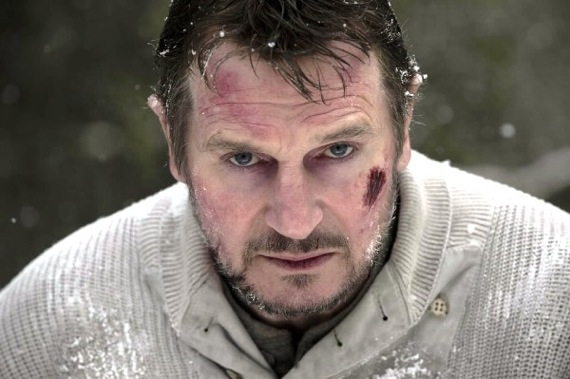It’s always interesting to witness the birth of an articulation between actor and genre — the moment when Hollywood’s endlessly spinning tumblers click into place with a tight and seemingly inevitable fit, fusing star and vehicle into a single, satisfying commercial package. For Liam Neeson, that grave and manly icon, the slot machine hit its combinatorial jackpot with 2008’s Taken, a thriller whose narrative economy was as ruthlessly single-minded as its protagonist; Neeson played a former CIA agent whose mission to rescue his kidnapped daughter lent the bloody body count a moral justification, like a perfectly-balanced throwing knife. Next came Unknown, less successful in leaping its logical gaps, but centered nonetheless by Neeson’s morose, careworn toughness.
The Grey gives us Neeson as yet another hardened but sensitive man, another action hero whose uncompromising competence in the face of disaster is saved from implausible superhumanity by virtue of the fact that he seems so reluctant to be going through it all; you sense that Neeson’s characters really wish they were in another kind of movie. It makes him just right for something like The Grey, in which a plane full of grizzled and boastful oil-drilling workers crashes in remote Alaskan territory, on what turns out to be the hunting and nesting grounds of a community of wolves. None of these guys wants to be there, especially after a crash scene so stroboscopically wrenching and whiplashy that it made my wife leave the room. Shortly after Neeson’s character makes his way to the smoking debris and discovers a handful of survivors, there is an exquisite scene in which he coaches a terminally-wounded man through the final seconds of his life. “You’re going to die,” Neeson gently and compassionately growls, as around him the other tough guys weep and turn away.
Nothing else that happens in the story quite matches that moment, and since the rest of the film is essentially one long death scene, I found myself wishing that someone like Neeson could help put the movie out of its misery. Not that the action of being hunted by wolves isn’t gripping — but as the team’s numbers wear down and it becomes clearer that no one is going to survive this thing, the tone becomes so meditative that I found myself numbing out, as though frostbitten. I’ve written before about annihilation narratives, and I continue to respond to the mordant pleasures of their zero-sum games, which appeal, I suspect, to the same part of me that likes washing every dish in the kitchen and then hosing the sink clean while the garbage disposal whirrs. (Scott Smith’s book The Ruins is perhaps my favorite recent instance of the tale from which no one escapes.) The Grey‘s slow trudge to its concluding frames induced a trance more than a chill, but the experience stayed with me for days afterward.

